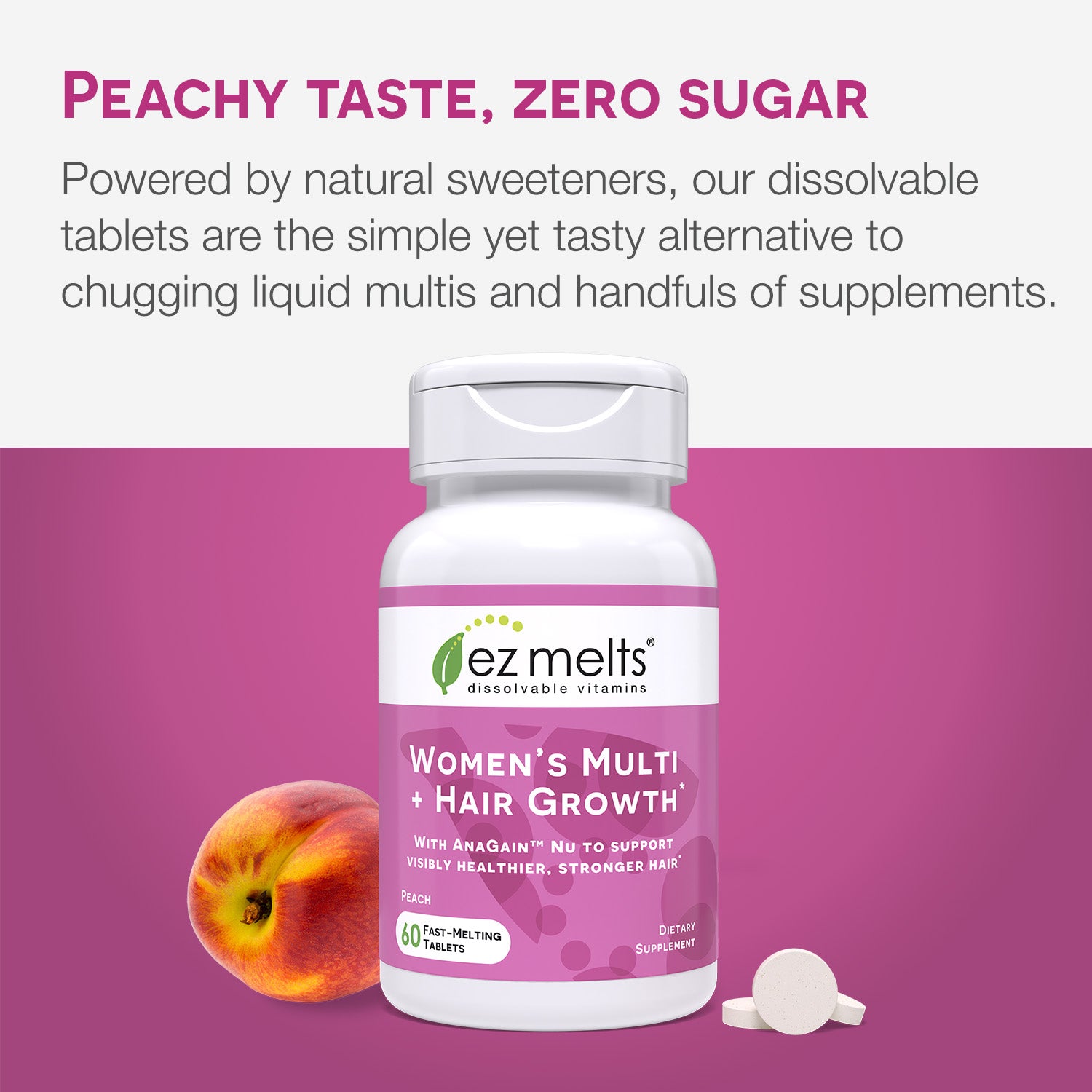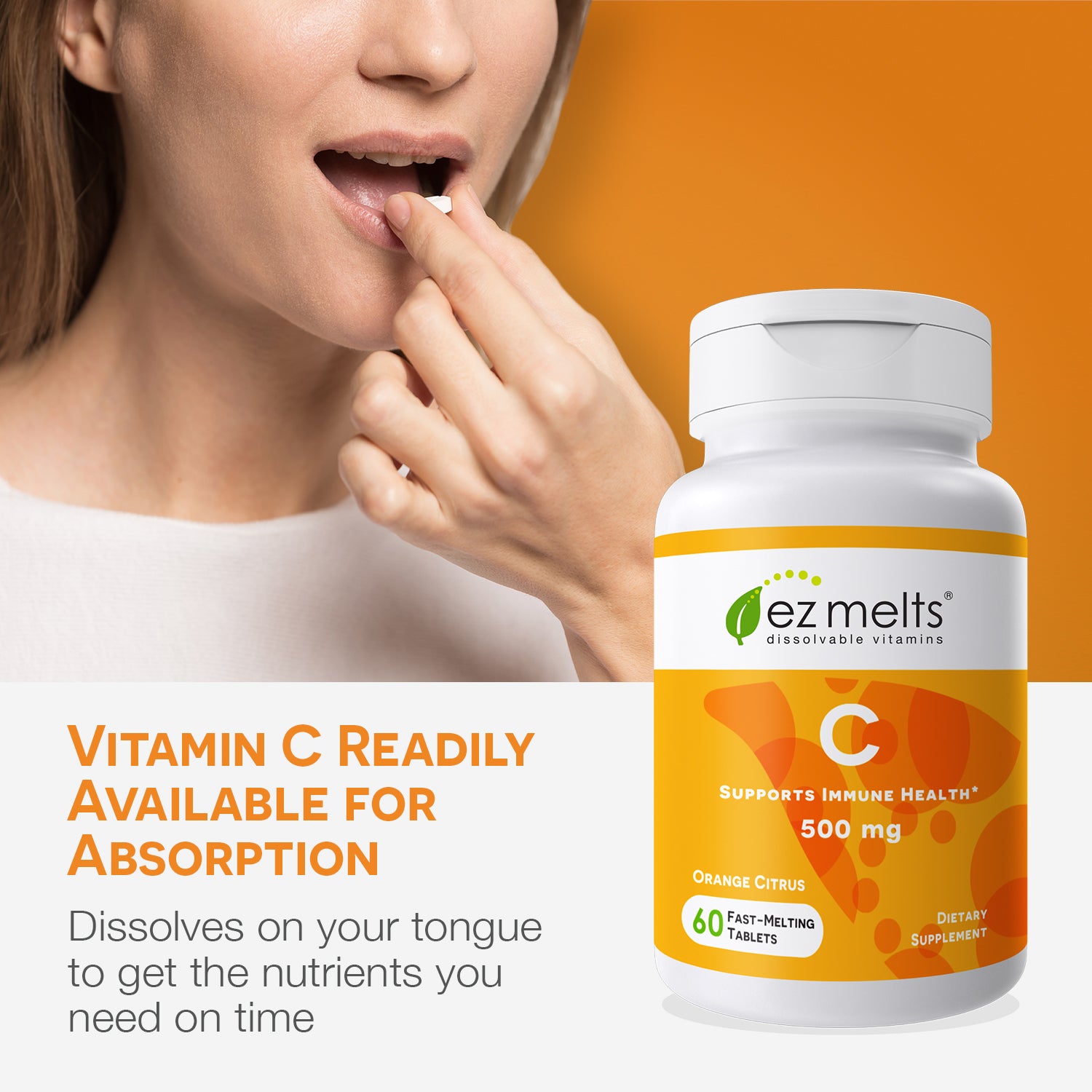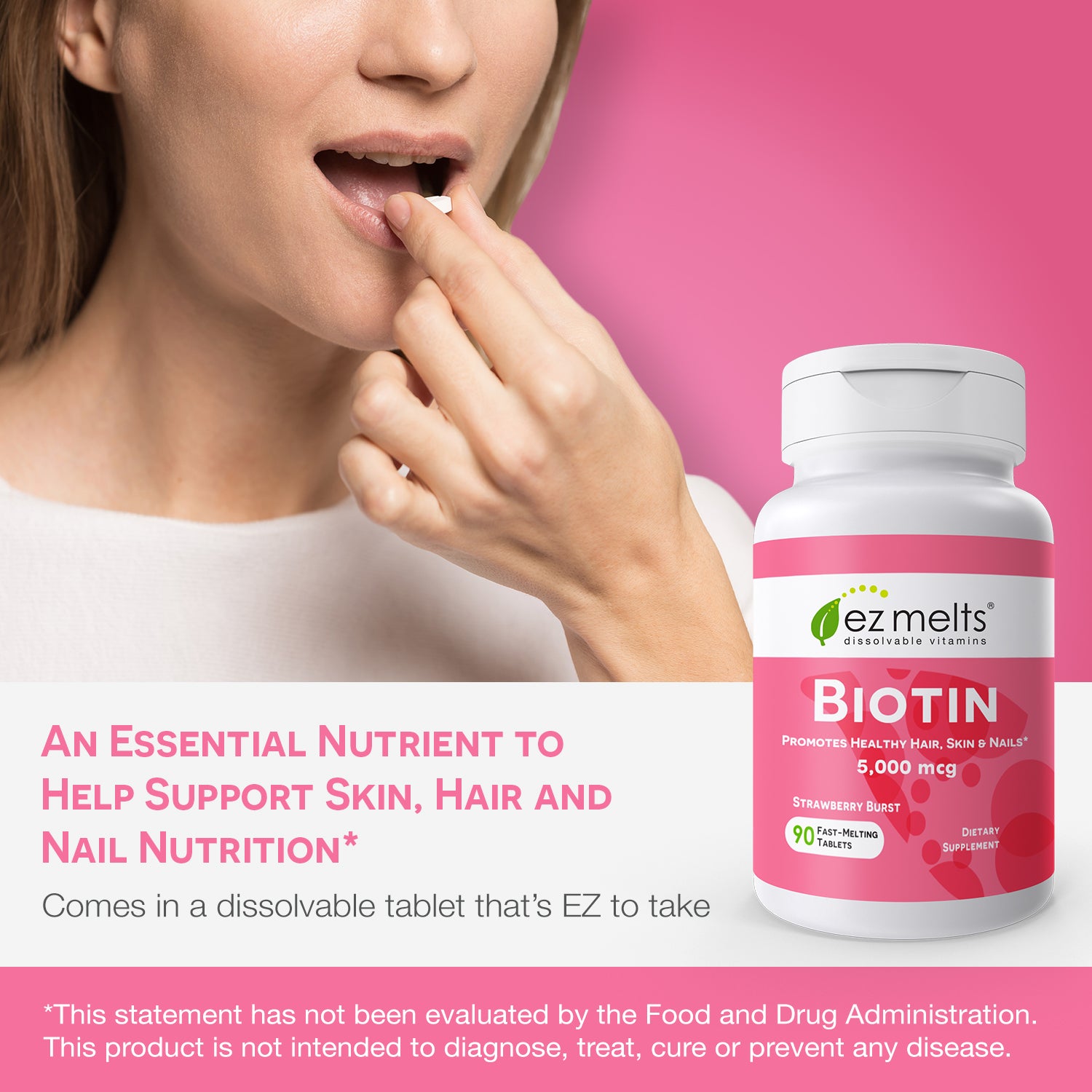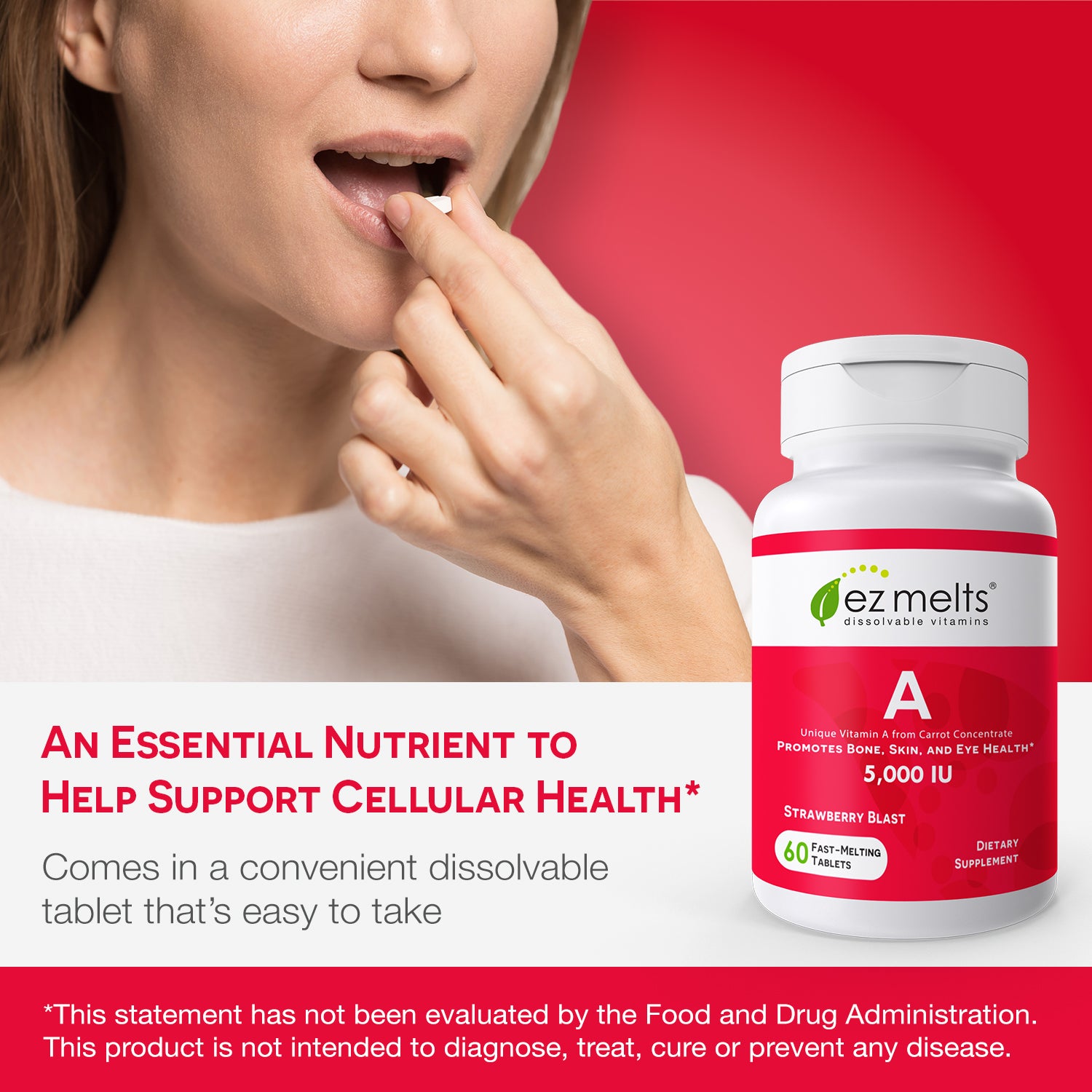Vitamins for Hair Growth
Sort by:
6 products
6 products
- Our Biotin supplement supports skin health and normal cell growth
- Promotes strong nails and healthy, smooth hair
- Supports blood sugar levels and protein metabolism
- 90 fast melting tablets with "Strawberry Burst" flavor
- MADE IN THE USA: Zero Sugar, Vegan, Gluten-Free, Non-GMO, Natural Flavors, Natural Sweeteners, Natural Colors
This bundle includes:
1 bottle of Vitamin A
1 bottle of Biotin
1 bottle of Vitamin C
MADE IN THE USA: Zero Sugar, Vegan, Gluten-Free, Non-GMO, Natural Flavors, Natural Sweeteners, Natural Colors
Vitamin A
- Promotes overall bone, skin and eye health
- Supports nervous system health, cell growth and renewal
- 60 fast melting tablets with "Strawberry Blast" flavor
Biotin
- Biotin supports skin health and normal cell growth
- Promotes strong nails and healthy, smooth hair
- Supports blood sugar levels and protein metabolism
- 90 fast melting tablets with "Strawberry Burst" flavor
Vitamin C
- Vitamin C supports healthy immune system
- Helps neutralize free-radicals and absorb Iron in the body
- Promotes cellular health and general wellbeing
- 60 fast melting tablets with "Orange Citrus" flavor
Vitamins for Hair Growth: Nutrients That Support Stronger, Healthier Hair
Hair is more than just a style statement — it’s often considered a reflection of health and vitality. From shine and texture to thickness and strength, many factors influence hair appearance, including genetics, environment, age, and daily care routines. But one element that often gets overlooked is nutrition.
Just like skin, nails, and muscles, hair is built from nutrients that your body absorbs through food and vitamins for hair growth. The right vitamins and minerals help support the body’s natural processes that maintain strong strands, nourish hair follicles, and encourage a healthy scalp. While there’s no “magic pill” for instant results, ensuring your body has access to the right building blocks can help you maintain hair that looks and feels its best.
This article explores the vitamins most commonly associated with hair growth and hair health, why they matter, and how to incorporate them into a balanced lifestyle.
The Connection Between Nutrition and Hair
Hair is made primarily of a protein called keratin. To produce keratin efficiently, your body needs an adequate supply of amino acids, vitamins, and minerals. Without them, hair may appear dull, weak, or more prone to breakage.
Nutrition doesn’t change genetics or instantly reverse hair concerns, but it provides your body with the raw materials it needs for maintenance and renewal. A nutrient-rich diet can help:
- Support the growth cycle of hair follicles
- Maintain normal collagen production for scalp health
- Reduce oxidative stress that can impact strand strength
- Promote natural shine and smoothness
Key Vitamins and Minerals That Support Hair Health
1. Biotin (Vitamin B7)
Biotin is perhaps the most widely recognized vitamin linked to hair wellness. It plays a role in supporting keratin production and helps the body metabolize proteins and fats that feed hair follicles. Adequate biotin intake is often associated with stronger hair and nails.
Natural Sources: Eggs, nuts, seeds, salmon, and sweet potatoes.
2. Vitamin C
Vitamin C is essential for collagen synthesis, which helps provide structure to the hair shaft. It also functions as a powerful antioxidant, helping protect hair from free radical stress caused by environmental factors. Additionally, vitamin C assists in iron absorption, which is important for maintaining overall energy and hair vitality.
Natural Sources: Citrus fruits, strawberries, bell peppers, and broccoli.
3. Vitamin A
All cells, including those in hair follicles, require vitamin A to grow. This vitamin also contributes to the production of sebum, an oily substance that moisturizes the scalp and keeps hair strands conditioned.
Natural Sources: Carrots, spinach, kale, and sweet potatoes.
4. Vitamin D
Low vitamin D levels have been associated with challenges in maintaining healthy hair follicles. While research is ongoing, vitamin D is believed to play a role in follicle cycling and scalp health. Adequate sunlight exposure or supplementation can help maintain optimal levels.
Natural Sources: Fatty fish (salmon, mackerel), fortified foods, and moderate sun exposure.
5. Vitamin E
Vitamin E acts as an antioxidant, helping protect scalp and follicle cells from oxidative stress. It is also associated with circulation, which supports nutrient delivery to the scalp.
Natural Sources: Sunflower seeds, almonds, avocados, and spinach.
6. B-Complex Vitamins
Beyond biotin, other B vitamins like B12, niacin (B3), and folate (B9) are important for energy metabolism and red blood cell production. These processes help deliver oxygen and nutrients to hair follicles, supporting their natural growth cycle.
Natural Sources: Leafy greens, legumes, poultry, and whole grains.
7. Iron
Iron helps red blood cells carry oxygen to the body’s tissues, including hair follicles. Adequate iron levels are important for maintaining strength and resilience in both hair and nails.
Natural Sources: Lean red meat, lentils, spinach, and fortified cereals.
8. Zinc
Zinc contributes to tissue growth and repair, including the renewal of hair cells. It also supports the oil glands around follicles, helping maintain a nourished scalp.
Natural Sources: Pumpkin seeds, oysters, beef, and chickpeas.
9. Protein
While not a vitamin or mineral, protein is the building block of keratin. Without sufficient protein intake, hair may not have the structural support it needs to remain thick and strong.
Natural Sources: Chicken, fish, beans, quinoa, and dairy.
Lifestyle Factors That Complement Vitamin Intake
While nutrition is key, several lifestyle habits also contribute to hair health:
-
Balanced Diet – Relying on whole foods ensures a broad spectrum of nutrients.
-
Stress Management – Chronic stress can impact the body’s natural cycles, including hair.
-
Hydration – Adequate water intake supports scalp and follicle function.
-
Gentle Hair Care – Avoiding harsh chemicals and minimizing heat styling can reduce breakage.
-
Regular Sleep – Restorative sleep allows the body to repair and regenerate, supporting overall wellness.
The Role of Supplements
For many people, diet alone may not provide sufficient quantities of certain vitamins, especially if they have dietary restrictions, limited access to fresh foods, or specific nutritional needs. Vitamins for hair growth can help fill these gaps and ensure the body has what it needs to maintain normal hair health.
It’s important to choose supplements from trusted sources and to follow recommended daily values. More is not always better — excessive intake of certain nutrients, such as vitamin A, can have negative effects.
Safety and Precautions
Before adding new supplements to your routine, it’s best to consult a healthcare professional. They can evaluate your diet, medical history, and individual needs to determine what’s appropriate.
Some vitamins interact with medications or can accumulate in the body at unsafe levels if overconsumed. Professional guidance ensures safe and effective use.
Final Thoughts
Healthy hair begins with overall wellness. While shampoos, oils, and topical treatments can enhance the appearance of strands, true nourishment starts from within. A diet rich in vitamins, minerals, and protein helps provide the foundation for hair that looks strong, shiny, and vibrant.
Remember, results vary for each individual, and no single nutrient works in isolation. A holistic approach — combining balanced nutrition, supplements if needed, and supportive lifestyle habits — gives your hair the best chance to thrive naturally.
FAQs About:
Vitamins for Hair Growth
Vitamins don’t work like instant solutions, but they do provide nutrients that support your body’s natural processes for maintaining healthy hair. Nutrients such as biotin, vitamin C, vitamin D, and zinc play roles in normal follicle function, protein metabolism, and scalp health. Adequate intake can help hair look stronger and more resilient over time.
Key vitamins and minerals often linked with hair health include biotin (B7), vitamin C, vitamin A, vitamin D, vitamin E, B-complex vitamins, zinc, and iron. Each contributes to different functions, such as collagen production, oxygen delivery to follicles, and keratin structure.
Hair grows slowly — on average, about half an inch per month. Because of this cycle, it may take several months of consistent nutrition and lifestyle habits before noticeable changes in strength, shine, or thickness appear.
Yes. More is not always better. Excessive intake of certain vitamins, especially fat-soluble ones like vitamin A or E, can have negative effects on overall health. It’s important to stay within recommended daily values and talk with a healthcare provider before starting supplements.
A balanced diet with plenty of fruits, vegetables, whole grains, and lean proteins often provides many of the nutrients hair needs. However, some people may have dietary gaps or higher nutritional needs. In those cases, supplements may help fill in, but they should be taken under professional guidance.






























